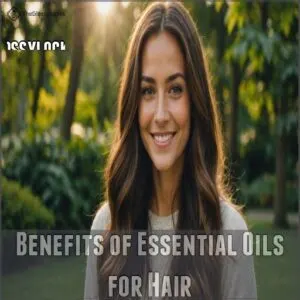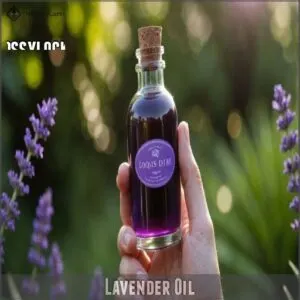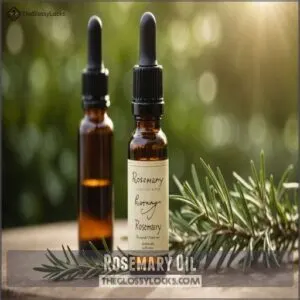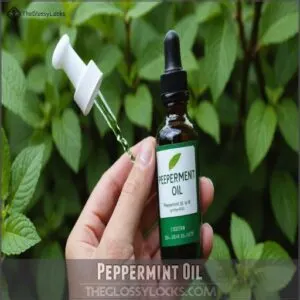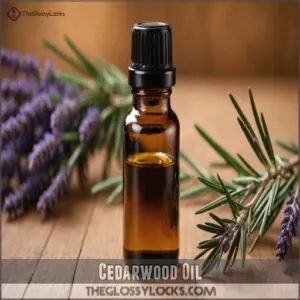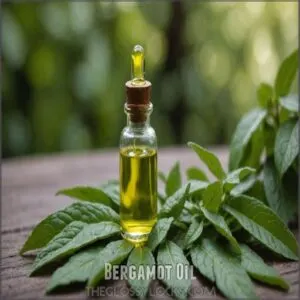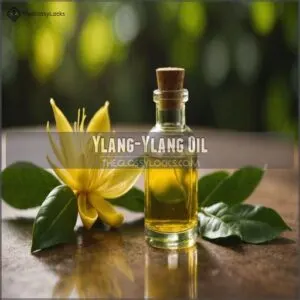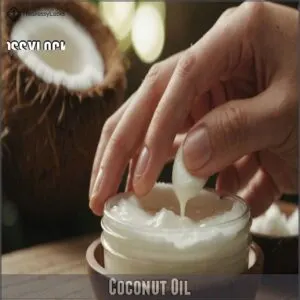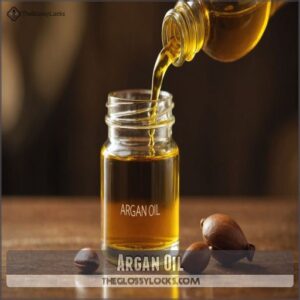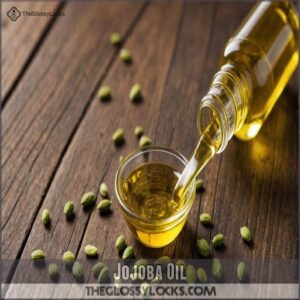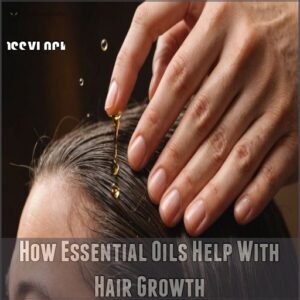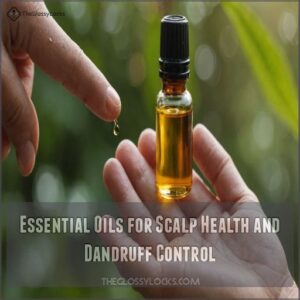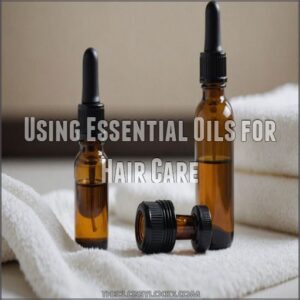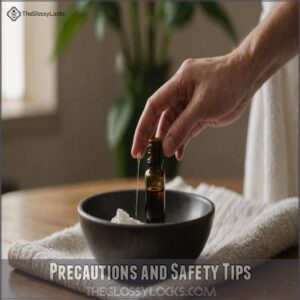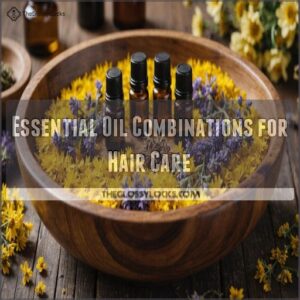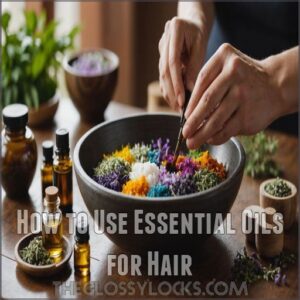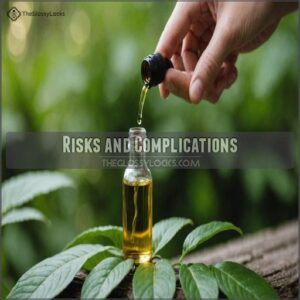This site is supported by our readers. We may earn a commission, at no cost to you, if you purchase through links.
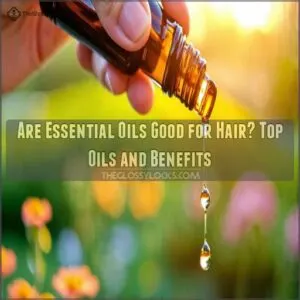 Wondering if essential oils are good for hair? You bet they are! These mighty oils can help normalize sebaceous glands and promote that enviable shine you’ve always wanted.
Wondering if essential oils are good for hair? You bet they are! These mighty oils can help normalize sebaceous glands and promote that enviable shine you’ve always wanted.
Essential oils like lavender, rosemary, and peppermint are known to stimulate hair growth by improving blood circulation and nourishing your scalp. They can also tackle dandruff and itchiness, making your scalp a happier place.
Just remember, never apply them directly—dilution is key! Think of them as your hair’s new best friend, with just a touch of alchemy involved. Curious about which oil reigns supreme for your locks? There’s more magic where that came from!
Table Of Contents
- Key Takeaways
- Benefits of Essential Oils for Hair
- Best Essential Oils for Hair Growth
- Essential Oils for Hair Strength and Shine
- How Essential Oils Help With Hair Growth
- Essential Oils for Scalp Health and Dandruff Control
- Using Essential Oils for Hair Care
- Precautions and Safety Tips
- Essential Oil Combinations for Hair Care
- How to Use Essential Oils for Hair
- Risks and Complications
- Frequently Asked Questions (FAQs)
- Are essential oils good for your hair?
- What is the best oil for men’s hair?
- Which essential oil is good for hair?
- What essential oil should I use to moisturize my hair?
- How can I use essential oils for hair growth?
- What essential oils are good for hair follicles?
- Which essential oils are safe for hair?
- Can I apply essential oil directly to hair?
- Do essential oils really help hair?
- What are the side effects of essential oils on hair?
- Can essential oils darken hair color?
- Do essential oils help with hair breakage?
- Are there essential oils for oily hair?
- Can essential oils prevent hair thinning?
- How often should I use hair oils?
- Conclusion
Key Takeaways
- You’ll find essential oils like lavender, rosemary, and peppermint can stimulate hair growth, balance scalp oil production, and enhance shine.
- Always dilute essential oils with carrier oils to avoid irritation; never apply them directly to your scalp or hair.
- These oils help combat dandruff and soothe itchiness, making them a natural solution for healthy scalp maintenance.
- Frequent use of essential oils can effectively strengthen and nourish hair, but moderation is key to avoid complications.
Benefits of Essential Oils for Hair
You might be surprised to learn that essential oils can enhance your hair care routine by promoting growth and improving scalp health.
They also add shine, reduce dandruff, and tackle itchiness, proving quite the multitaskers in the quest for fabulous hair.
Promoting Hair Growth
Ever dreamed your hair could grow like weeds after a rainy spell. Essential oils might be your secret weapon!
Here’s why: Essential oils can promote hair growth by tickling those follicles.
They also fortify strands, reducing hair breakage.
Furthermore, essential oils enhance hair thickness by nourishing the scalp.
Finally, they assist the hair cycle’s faster pace.
So, grab those essential oils for some hair growth magic!
Improving Scalp Health
Boosting hair growth is a hot topic, but caring for your scalp is just as important.
Essential oils like lavender and tea tree can enhance scalp health, reducing dandruff and improving circulation.
A gentle scalp massage with these oils can stimulate hair follicles, promoting growth and treating scalp issues.
Think of it as TLC for your scalp.
Adding Shine and Luster
A healthy scalp paves the way for shiny hair.
Now, let’s talk about adding shine and luster! Argan oil and coconut oil are your secret weapons for natural shine. They moisturize, leaving your hair soft and radiant. Experiment with oil blends for DIY shine treatments. Discover your hair’s luster secrets!
- Imagine your hair shimmering like a star. ✨
- Feel the silky smoothness against your skin. 殺
- See heads turn as you walk by. 朗
- Experience the confidence that comes with gorgeous hair.
- Realize your hair’s full potential.
Reducing Dandruff and Itchiness
While adding shine is great, tackling dandruff and itchiness is often a priority.
Essential oils like tea tree are heroics for scalp health, serving as natural remedies against dandruff.
For more information on natural remedies for a dry scalp
Mix them into DIY treatments for best results.
| Symptom | Essential Oil |
|---|---|
| Dandruff | Tea Tree Oil |
| Itchiness | Lavender Oil |
| Dry Scalp | Jojoba Oil |
| Oily Scalp | Lemongrass Oil |
| Scalp Irritation | Chamomile Oil |
Best Essential Oils for Hair Growth
You might be wondering if those tiny bottles of essential oils can give your hair the boost it needs to grow longer and healthier.
From lavender and peppermint to rosemary and cedarwood, research suggests these oils could potentially enhance hair growth, although a bit more evidence would be nice before we declare a magic potion.
Lavender Oil
Lavender oil could be your hair’s best friend, offering benefits that might surprise you.
Try it in a lavender oil hair mask to support growth and soothe your scalp.
You can find various lavender oil products for hair loss treatment online, such as those at this hair loss store.
The essential oils’ antifungal properties may help reduce dandruff and improve overall
Rosemary Oil
Lavender’s calming effects get a lot of buzz, but for hair growth, rosemary oil steals the show.
It’s been shown to match minoxidil in promoting thickness, without the itchiness.
Got dandruff? Rosemary oil can help there too.
Try a rosemary oil hair mask for a natural remedy that keeps your scalp healthy and your hair shining!
Peppermint Oil
Consider the hair benefits of peppermint oil after rosemary’s stellar performance.
This essential oil makes your scalp tingle pleasantly, thanks to menthol’s magic.
Peppermint oil boosts hair growth by enhancing hair follicles and supporting scalp health.
Try a DIY hair mask for added shine or a stimulating scalp massage—scientific research hints at its promising potential in hair growth studies.
Cedarwood Oil
The secret to cedarwood oil’s charm lies in its ability to balance scalp oil production, which might give you a leg up in the fight against hair loss.
This potent oil’s antifungal and antibacterial properties make it a top pick for scalp health.
Whether you’re comparing cedarwood oil vs rosemary for hair growth, this essential oil promises a scalp treatment that’s truly hair-friendly magic.
Bergamot Oil
A citrusy scent, bergamot oil, might just be your hair’s new best friend.
Its antimicrobial properties can help keep your scalp healthy, potentially boosting hair growth.
However, remember that bergamot oil can increase sun sensitivity, so always dilute it with a carrier oil like jojoba before applying.
While studies suggest benefits, more research is needed to confirm its effects on hair follicles.
It’s a great addition to oil blends for hair care, but always perform a patch test first to check for skin sensitivity.
Essential Oils for Hair Strength and Shine
You might think your hair’s strength and shine is all about good genes, but the right essential oils can also make a big difference.
Ylang-ylang, coconut, argan, and jojoba oils are scientifically shown to fortify your strands while adding that enviable gleam, making your hair look like it belongs in a shampoo commercial.
Ylang-Ylang Oil
If you’re looking to boost your hair’s shine and strength, ylang-ylang oil might be your hero.
Known for its delightful scent, it also aids hair softness.
Here’s how to make the most of it:
- Mix with carrier oils for hair growth.
- Add to shampoos for hair care benefits.
- Create blends for unique scents.
- Use in masks for hair shine.
Coconut Oil
Ylang-ylang sets the stage with its exotic flair; now, let’s spotlight coconut oil.
Packed with lauric acid, coconut oil dives deep into your hair’s core, enhancing strength and shine.
For an easy start, explore DIY coconut oil products online at coconut oil hair care.
Got dry hair woes? Kiss them goodbye with DIY coconut oil products and hair
Argan Oil
Picture argan oil as your hair’s secret weapon, battling dryness and adding shine.
Consider other essential oils that can enhance hair shine, such as Lavender Oil.
This liquid gold is a favorite for taming frizzy, curly hair and soothing dry scalps.
Think of an argan oil hair mask as a spa day for your strands, while its light texture makes it
Jojoba Oil
Curious about battling thinning hair?
Let jojoba oil be your ally.
This versatile oil mimics your scalp’s natural sebum, reducing protein loss, and restoring shine.
Whether your locks are parched or greasy, jojoba oil for hair care is a game-changer.
Plus, when pitted against coconut oil, it’s a top contender for hair growth and scalp health.
How Essential Oils Help With Hair Growth
You might be surprised to learn that essential oils can give your hair follicles a wake-up call, promoting growth and health by stimulating them and improving blood circulation to the scalp.
Balancing your scalp’s pH and moisturizing it, these oils offer a natural boost that makes your hair feel like it’s had a spa day without the hefty price tag.
Stimulating Hair Follicles
So, you’ve boosted shine with oils.
Now, let’s talk follicle stimulation!
Certain essential oils, like rosemary and peppermint, might help wake up those sleeping hair follicles.
Think of it as a gentle nudge to encourage new growth.
Regular scalp massage techniques, combined with these oils, can improve hair follicle health.
This isn’t a magic bullet, but it’s a natural approach to support your hair growth cycle and prevent hair loss.
Remember, consistency is key for follicle stimulation benefits!
Improving Blood Circulation in Scalp
Activating hair follicles naturally brings the next question: how to improve blood circulation in the scalp?
Well, scalp massage techniques infused with essential oils invigorate this process.
Here’s how:
- Boost scalp health with DIY scalp oil recipes.
- Enjoy hair growth benefits through scalp massage.
- Use essential oil blends for wellness and relaxation.
- Strengthen hair follicles for overall health.
Balancing Scalp PH
Balancing your scalp PH is key for healthy hair growth.
An acidic scalp, often linked to dandruff and other scalp issues, can benefit from essential oils.
For instance, a 1-3% dilution of essential oils for hair growth is recommended for good results.
Regular scalp massage with oils like rosemary or tea tree helps maintain good PH levels, promoting scalp care.
Nourishing and Moisturizing The Scalp
Finding that perfect balance is key, isn’t it?
Now, let’s uncover how essential oils nourish and moisturize your scalp.
They act like nature’s conditioner, giving dry scalps the hydration they crave.
Scalp massage techniques with oils like jojoba or coconut can invigorate hair follicles and boost hair health.
So, whip up a homemade scalp treatment and watch your hair thrive!
Essential Oils for Scalp Health and Dandruff Control
Struggling with an itchy scalp or persistent dandruff?
Essential oils like tea tree, lemongrass, chamomile, and geranium can offer a natural way to support your scalp’s health and keep dandruff at bay.
All while adding a soothing aroma to your hair care routine.
Tea Tree Oil
When you’re grappling with flaky scalps, tea tree oil comes to the rescue.
Known for its antiseptic powers, it helps nip dandruff and acne in the bud.
Just mix a few drops into your shampoo or try a tea tree oil hair mask.
It boosts scalp health, but it may also prevent hair loss with regular use.
Lemongrass Oil
Lemongrass oil swoops in like a superhero for your scalp, battling dandruff with its antifungal powers.
This essential oil doubles as a fragrant teammate in your hair care routine, promoting scalp health without breaking a sweat.
Be cautious, though—a little goes a long way, and always dilute it to avoid potential irritation risks.
Ready for a DIY hair rescue mission?
Chamomile Oil
So, you’ve explored lemongrass oil’s benefits? Let’s move on to chamomile oil. Known for its soothing properties, chamomile oil can calm an irritated scalp. It’s often used in chamomile oil hair masks to combat dandruff. While not a miracle hair growth solution, its anti-inflammatory actions might support a healthy scalp environment. Remember to always dilute it with a carrier oil before applying it directly to your scalp. Consider chamomile oil for scalp health and dandruff control, but remember that more research is needed to confirm its effects.
Geranium Oil
Chamomile oil offers gentle care, but if dandruff’s the dragon you’re battling, geranium oil might be your knight.
Known for its soothing properties, geranium oil benefits include promoting scalp health and controlling dandruff.
You’ll find it balances sebum production, helping your hair stay vibrant.
Effective geranium oil uses enhance hair growth and keep your hair care routine simple yet impactful with these essential oils.
Using Essential Oils for Hair Care
You can enhance your hair care routine by using essential oils, which, when properly diluted, offer potential benefits such as promoting growth and nourishment.
Essential oils provide a natural way to support healthy, vibrant hair.
Whether you’re mixing them into a DIY hair mask or adding them to your daily shampoo, essential oils provide a natural way to support healthy, vibrant hair.
Diluting With Carrier Oils
When using essential oils for hair, don’t go overboard; diluting them with carrier oils is a must.
It helps prevent irritation and enhances oil benefits, similar to how rosemary oil is diluted to maximize hair growth benefits.
Here’s how:
- Choose Wisely: Use coconut or jojoba oil for dilution.
- Dilution
Adding to Shampoo or Conditioner
Adding essential oils to your shampoo or conditioner is a breeze!
Just mix a few drops with your regular product.
Make sure to use proper dilution ratios and choose the right carrier oils for the job.
This simple tweak can enhance hair and scalp health, making it a straightforward way to upgrade your hair care game.
Creating DIY Hair Masks
Crafting DIY hair masks with essential oils can be a breeze and a game-changer for your routine. For maximum benefit, use them as a deep conditioning treatment, providing intense moisture and nourishment to the hair, as with the benefits of hair masks. With the right blend, you’ll nourish your hair and scalp.
- Mix equal parts coconut oil and jojoba oil, adding a few
Making a Scalp Massage Oil
Mixing a scalp massage oil is like preparing a potion for hair magic.
Combine your favorite essential oil blends with carrier oil options like coconut or jojoba.
This DIY recipe enhances hair growth by stimulating hair follicles and improving scalp health.
Don’t forget to follow application tips and storage advice to maximize benefits.
Your scalp will thank you!
Precautions and Safety Tips
Before you start experimenting, remember that essential oils aren’t magic potions; some folks can have allergic reactions, so always do a patch test first.
It’s also wise to chat with your doctor if you’re pregnant, breastfeeding, or taking any medications, just to be on the safe side.
Allergic Reactions and Irritations
Essentials oils might just be your secret sauce for glossy locks, yet watch out for allergic reactions and irritations.
A simple skin testing or patch test can prevent unwanted surprises like contact dermatitis.
Dilution is key; undiluted oils are strong and can cause scalp issues.
Even gentle oils like tea tree oil should be used sensibly for peace of mind.
Sensitivity to Sunlight
Using essential oils like bergamot or lavender can increase photosensitivity, making your skin more likely to react to sunlight exposure.
Imagine sporting a sunburn risk like wearing socks with sandals—it’s just not the look you’re going for.
Apply these oils carefully; consider the timing and cover-up if you’re heading outdoors to maintain healthy scalp health and avoid skin reactions.
Pregnancy and Breastfeeding
Pregnancy and breastfeeding can make you pause before lathering on essential oils.
Here’s how to keep it safe:
- Consult your doctor about essential oils safety during pregnancy.
- Avoid essential oils like rosemary and sage known to affect hormonal balance.
- Opt for safe essential oils such as lavender.
- Always dilute oils for topical application to reduce risks.
Interactions With Medications
A friend once said, "Mixing meds and oils might spell trouble!"
It’s wise to check for drug interactions before diving into essential oils for hair growth.
Not all oils are created equal when meds come into play—medical advice is your safety net.
Prioritize essential oil safety, keeping hair and scalp health top notch.
| Scenario | Risk Level | Precaution |
|---|---|---|
| High Blood Pressure | High | Avoid peppermint oil |
| Allergies | Moderate | Patch test first |
| Prescription Meds | Variable | Consult your doctor |
Essential Oil Combinations for Hair Care
Combining essential oils like cedarwood, clary sage, and lavender can provide a synergistic boost to your hair care routine.
These mixtures are believed to enhance hair growth and balance scalp oil production.
They also add a pleasant scent, making your scalp feel as pampered as a spa day at home.
Cedarwood + Clary Sage + Lavender
You already know the precautions, so let’s explore cedarwood, clary sage, and lavender oils for hair care.
This combo enhances scalp health, supports hair growth, and delights with its aromatherapy blends.
- Cedarwood Oil: Balances oil production
- Clary Sage Oil: Encourages hair growth
- Lavender Oil: Provides soothing effects
- DIY Recipe: Mix them with a carrier oil
Rosemary + Clary Sage + Cedarwood
Three powerhouse oils—rosemary, clary sage, and cedarwood—combine for impressive hair benefits.
Rosemary stimulates hair growth, while clary sage balances oil production.
Cedarwood combats hair loss and promotes thickness.
| Oil | Benefit | How to Use |
|---|---|---|
| Rosemary Oil | Stimulates hair growth | Add to carrier oil, massage into scalp |
| Clary Sage Oil | Balances scalp oil production | Mix with other oils, apply to scalp |
| Cedarwood Oil | Combats hair loss, promotes thickness | Use in hair masks or scalp treatments |
| Oil Blend | Improves overall hair health and growth | Apply diluted blend to scalp and hair regularly |
Peppermint + Lavender + Tea Tree
Why not give your hair a natural boost with a DIY blend of peppermint, lavender, and tea tree essential oils?
This powerful trio supports scalp health and hair growth, thanks to their anti-inflammatory and antimicrobial properties.
Massage them in and enjoy the tingling sensation that helps combat hair loss while promoting a healthier, fuller mane.
Ylang Ylang + Sweet Orange + Bergamot
Imagine a garden of scents with ylang ylang, sweet orange, and bergamot essential oils, perfect for a DIY hair care experience with products like Ylang Ylang Hair Oil.
- Scalp relaxation with calming effects.
- Hair fragrance that evokes a sensory experience.
- Hair conditioning to enhance shine.
- Hair strength
How to Use Essential Oils for Hair
Incorporating essential oils into your hair care routine can be as easy as mixing them into shampoos, conditioners, or crafting a homemade hair mask.
Whether you’re prepping a pre-shampoo treatment or a leave-in conditioner, remember to dilute the oils properly to make sure both safety and effectiveness.
Hair Masks
When crafting DIY hair masks, essential oils like lavender or rosemary can work wonders for hair growth and scalp health.
Mix essential oils with ingredients like coconut oil for weekly use.
Apply the mixture, let it sit, and rinse for stunning results.
| Mask Ingredients | Mask Frequency | Mask Results |
|---|---|---|
| Lavender + Coconut | Weekly | Strengthened Hair |
| Rosemary + Olive | Bi-weekly | Enhanced Shine |
| Peppermint + Jojoba | Monthly | Improved Health |
Shampoos and Conditioners
You’ve just created a fantastic hair mask, now consider using essential oils in your shampoo and conditioner for added oomph.
Essential oil shampoos and conditioners can revitalize and strengthen your hair.
Here’s how you do it:
- Mix a few drops with your regular shampoo.
- Tailor blends for your hair type using carrier oils.
- Explore DIY recipes for specific needs.
- Check brand reviews for trusted products.
Leave-in Treatments
Just finished debating shampoos and conditioners?
It’s time to chat about leave-in treatments.
These are your hair’s best friend, especially for overnight care.
Simply blend a few drops of essential oils into your hair serum for a DIY leave-in treatment that tackles hair loss while boosting growth and shine.
Plus, choosing the right leave-in for your hair type maximizes benefits.
Pre-shampoo Treatments
Ready for a pre-shampoo power-up? Instead of leaving oils in, apply them before shampooing.
This pre-shampoo routine helps oils penetrate hair and scalp better, boosting hair growth and addressing scalp issues.
Try a DIY pre-shampoo mask with a few drops of lavender or rosemary oil mixed with a carrier oil like coconut.
Pre-shampoo oil types are many; experiment to find what works best for your hair!
Remember, consistency is key – aim for a pre-shampoo frequency of once or twice a week.
Risks and Complications
When using essential oils for your hair, it’s important not to skip the safety measures, like diluting the oils and watching out for any allergic reactions—nobody wants a surprise rash after a relaxing scalp massage.
Consulting a doctor is also wise if you’re unsure, ensuring your journey to fabulous hair doesn’t backfire with unwanted side effects.
Overusing Essential Oils
Too much of a good thing? Overusing essential oils can lead to complications like scalp irritation or hair breakage.
You might notice:
- Skin sensitivity and redness
- Oil buildup, creating a greasy appearance
- Dandruff aggravation from clogged pores
- Excessive use won’t boost hair growth but could trigger scalp issues
Keep your hair care routine balanced and effective.
Using Undiluted Essential Oils
You might think using undiluted essential oils is a shortcut to lush locks, but it’s like walking on a tightrope without a safety net.
These potent oils can lead to skin irritation, scalp burns, and even hair damage.
Always mix them with carrier oils to dodge these DIY risks and make your hair care safe and effective.
Ignoring Allergic Reactions
When using essential oils for hair, ignoring allergic reactions is like playing with fire.
Skin irritation or contact dermatitis can sneak up on you.
Always do a patch test first.
Follow these steps:
- Use carrier oils for safe dilution.
- Apply to a small skin area.
- Wait 24 hours for any reactions.
Better safe than sorry!
Not Consulting a Doctor
Diving headfirst into using essential oils for hair, like some kind of miracle potion, might seem tempting.
But without consulting a doctor, you could risk unwanted scalp issues or hair loss.
Essential oils aren’t just fancy hair products; they can cause side effects if misused.
So, save yourself from a hairy situation and seek medical advice before starting your scalp massage.
Frequently Asked Questions (FAQs)
Are essential oils good for your hair?
Nearly 60% of essential oil users believe it enhances hair health.
Oils like lavender and peppermint can boost growth and scalp health, though they might irritate some folks.
Always dilute before use, and patch-test first.
What is the best oil for men’s hair?
For men’s hair, coconut oil shines as an excellent choice.
Its ability to deeply penetrate the hair shaft helps repair damage and retain moisture.
Just a little goes a long way, keeping hair healthy and nourished.
Which essential oil is good for hair?
You’ll experience a hair revolution with rosemary essential oil!
It’s been shown to enhance hair growth and thickness by stimulating cellular regeneration.
Studies even compare its effectiveness to minoxidil.
Mix it with carrier oil for scalp application.
What essential oil should I use to moisturize my hair?
Argan oil’s moisturizing effects make it a fantastic choice for your hair.
Rich in fatty acids, it nourishes and hydrates, transforming dry strands into silky, lush locks.
Apply after washing for best results, and enjoy that soft, shiny finish.
How can I use essential oils for hair growth?
An ounce of prevention is worth a pound of cure.
Massage 2-3 drops of essential oil like rosemary or peppermint with a tablespoon of carrier oil.
Massage into your scalp gently for 2-3 minutes.
What essential oils are good for hair follicles?
Try lavender, rosemary, and peppermint essential oils for hair follicles.
Lavender might improve scalp health, while rosemary can enhance thickness.
Peppermint’s unique tingling helps stimulate hair growth.
Always dilute these with a carrier oil before use.
Which essential oils are safe for hair?
Think of your hair as a garden.
Lavender, rosemary, and peppermint oils, diluted in a carrier oil, are generally considered safe for topical use.
But always do a patch test first to check for allergies.
Can I apply essential oil directly to hair?
Applying essential oils directly to hair isn’t advisable.
Always dilute them with a carrier oil like coconut or jojoba to avoid irritation.
Besides being safer, it also helps the essential oil spread better and work effectively.
Do essential oils really help hair?
While your hair may not be Houdini with essential oils, they can promote growth and thickness.
Oils like lavender and rosemary boost scalp health, but remember, results vary.
Always dilute and patch-test to avoid surprises.
What are the side effects of essential oils on hair?
You might notice itchiness, swelling, or irritation when using essential oils on your hair, especially if they’re not properly diluted.
Some oils can even cause allergic reactions or increase sun sensitivity.
Always patch test and dilute well.
Can essential oils darken hair color?
Imagine using essential oils and seeing your hair subtly darken over time.
Oils like rosemary might darken hair slightly by enhancing its shine and depth.
However, results vary, and significant color changes aren’t typically expected.
Do essential oils help with hair breakage?
Essential oils, like coconut and olive oil, can help reduce hair breakage by moisturizing the hair shaft, enhancing strength, and reducing protein loss.
Essential oils can be a great way to improve hair health, but it’s important to be careful.
Always dilute essential oils before application to avoid irritation.
Are there essential oils for oily hair?
Tame that oil slick on your head with cedarwood and tea tree essential oils.
These natural wonders can balance sebum production on your scalp, making your hair less oily and leaving you feeling fresh and fabulous.
Can essential oils prevent hair thinning?
Some studies suggest certain essential oils, like rosemary and peppermint, might help.
However, more research is needed to confirm their effectiveness in preventing hair thinning.
Always dilute them with a carrier oil before applying to your scalp.
How often should I use hair oils?
You’ve got your hands on hair oils, but how often to use them?
Aim for 1-2 times a week.
This frequency nourishes without overwhelming.
Adjust based on hair type—everyone’s mane dances to its own rhythm!
Conclusion
From fabulous follicles to shiny strands, essential oils offer a myriad of benefits for your hair.
They can nourish your scalp, promote healthy hair growth, and keep dandruff at bay.
While harnessing their power can bring beauty benefits, remember, it all hinges on proper use.
Dilution is your hair’s best ally, preventing irritation while ensuring effectiveness.
So, are essential oils good for hair? Absolutely! They might just be the natural boost your hair care routine needs.

